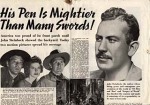“… and in the eyes of the hungry there is a growing wrath. In the souls of the people the grapes of wrath are filling and growing heavy, growing heavy for the vintage.”
 Welcome to The Classic Circuit’s Steinbeck Tour! (Click on the button to the left to link to other blog posts discussing John Steinbeck’s work.) The book I chose for the tour was the 1939 Steinbeck classic The Grapes of Wrath which chronicles the lives of the Joad family as they are forced out of their home in Oklahoma, travel to California, and try to survive their new circumstances as migrant workers. They head to California with a dream of new land and new chances, but certainly not by choice.The Joads are sharecroppers who have been replaced by more efficient farm machinery because losses from the Depression, drought, crop failure, and foreclosure must be recouped at all costs.
Welcome to The Classic Circuit’s Steinbeck Tour! (Click on the button to the left to link to other blog posts discussing John Steinbeck’s work.) The book I chose for the tour was the 1939 Steinbeck classic The Grapes of Wrath which chronicles the lives of the Joad family as they are forced out of their home in Oklahoma, travel to California, and try to survive their new circumstances as migrant workers. They head to California with a dream of new land and new chances, but certainly not by choice.The Joads are sharecroppers who have been replaced by more efficient farm machinery because losses from the Depression, drought, crop failure, and foreclosure must be recouped at all costs.
 When I was a kid, potatoes were the crop of choice in my small town and its surrounding areas. Toward the end of summer, migrant workers would travel up from the south to pick the potatoes. Suddenly, there would be strangers in the grocery store and laundromat. When school started, there would be new faces in our classroom that would be gone again before Halloween. They were a seasonal fixture for many years, but I never really gave these families much thought as a child. While reading The Grapes of Wrath, I began to wonder: where did these people stay while they were here, how much were they paid for their labor, were they made to feel like outcasts, foreigners in their own country?
When I was a kid, potatoes were the crop of choice in my small town and its surrounding areas. Toward the end of summer, migrant workers would travel up from the south to pick the potatoes. Suddenly, there would be strangers in the grocery store and laundromat. When school started, there would be new faces in our classroom that would be gone again before Halloween. They were a seasonal fixture for many years, but I never really gave these families much thought as a child. While reading The Grapes of Wrath, I began to wonder: where did these people stay while they were here, how much were they paid for their labor, were they made to feel like outcasts, foreigners in their own country?
“Okies” like the Joads sure were. The Californian owners purposely brought them to their towns. They passed out handbills back in Oklahoma advertising work knowing that if they could lure hundreds of desperate people to their orchards and fields they could procure the cheapest labor possible. If one man would not work for pennies there would be another hungry man standing behind him, with starving children at camp, who would. They brought them there, but then had the nerve to despise the burden they had created.
“They were hungry, and they were fierce. And they had hoped to find a home, and they found only hatred. Okies – the owners hated them because the owners knew they were soft and the Okies strong … and perhaps the owners had heard from their grandfathers how easy it is to steal land from a soft man if you are fierce and hungry and armed. The owners hated them. And in the towns, the storekeepers hated them because they had no money to spend … and the laboring people hated Okies because a hungry man must work, and if he must work he has to work, the wage payer automatically gives him less for his work; and then no one can get more.”
California turned out to be a nightmare. The Joads were discouraged, destitute, homeless, hungry, and work was scarce. And yet, where there is a community of survivors, there is hope. There were hundreds, thousands of people in this same situation. Perhaps the formation of unions could be the salvation for these laborers? Even more interesting, what would happen if all the strong matriarchs like Ma Joad were to unite? She was quite a woman!
“Keep these two squatting men apart; make them hate, fear suspect each other … the danger is here, for two men are not as lonely and perplexed as one … the two men squatting in the ditch, the little fire … the children listening with their souls to words they do not understand. The night draws down. The baby has a cold. Here, take this blanket. It’s wool. It was my mother’s blanket – take it for the baby … this is the beginning – from I to we.”
This novel made me think about many things. There was so much to wrap my head around, but perhaps I was most struck by the notion that despite all our technological advances in the last 70 years, we really haven’t come that far. Big business is still pushing out the little guy. Unemployment is a major issue facing Americans right now. Homes are in foreclosure. The Hoovervillles that the Joad’s encountered in California bear striking resemblance to the tent cities that sprung up in California due to the housing crisis.
My one criticism is that the ending was too abrupt. Steinbeck had lured me in. I was invested in this family. Oh Steinbeck, what happens next? You succeeded, the Joads are haunting me. As they should.
Favorite Quotes:
“I figgered, maybe it’s all men an’ all women we love; maybe that’s the Holy Sperit – the human sperit – the whole shebang. Maybe all men got one big soul ever’body’s a part of.” – Casy, the former preacher
“Use ta rip off a prayer an’ all the troubles’d stick to that prayer like flies on fly paper, an’the prayer’d go a-sailin’ off, a-taken them troubles along.” – Casy


This one is particularly relevant right now. It’s amazing to think about what the Joads went through to try to get work. Steinbeck really captures the feeling of desperation.
I can’t imagine having to go through what the Joad’s did … I kept hoping that they would atleast be able to stay in the government camp …
I love this book! As far as the abrupt ending, I was just reading on caribousmom’s blog a quote from one of Steinbeck’s letters saying that his editor begged him the change the end, but he wanted it to be unsatisfying to the reader. So I guess it worked!
Thanks for sharing that tidbit, Shelley! I will have to check out caribousmom’s blog. Interesting that Steinbeck intended to leave the reader unsatisfied, hungry … much like the Joad’s.
I am in the middle of this (they just crossed into California) and I can tell it’s going to be sad in California too. I keep feeling amazed that he wrote it in the 1930s! It was happening as he wrote it. It just seems so relevant to think of people in the midst of the Depression reading this…and then your point of it applying to today is right on too. I’m looking forward to finishing the book.
This was my first Steinbeck, and I loved it. I remember getting to the end and feeling like it was too abrupt. I really need to re-read this one–it’s been 15 years!. You’re completely correct about how relevant it is to what Americans are facing right now.
Pingback: Weekly Round-up for August 6, 2012. « The Classics Club
If Steinbeck wanted the ending to be unsatisfying and leave us haunted by the Joads, he certainly succeeded!
He ended the story so abruptly to make the Joad’s story a universal story. In the end, what happens to one family is what’s happening to millions of them. What happens next is irrelevant (even if we all die to know). What Steinbeck wants to do is start a reflection in everybody’s mind. By letting the end so end, it also allows the reader a more powerful identification to the characters. Anyway, Grapes of Wrath is like all Steinbeck’s…just an appetizer for some more!